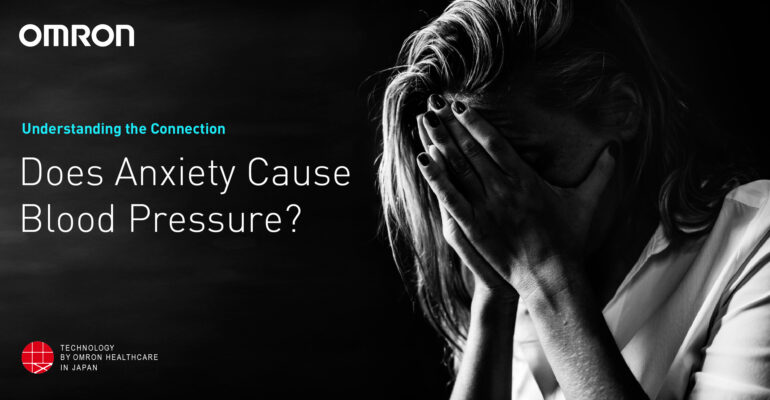Does Anxiety Cause Blood Pressure?
December 25, 2022 2023-09-11 15:33Does Anxiety Cause Blood Pressure?

Does Anxiety Cause Blood Pressure?
Anxiety is a common mental health condition that affects a significant portion of the population. Anxiety disorders affect 3.94% of the worldwide population and can interfere with daily activities such as job performance and relationships.[1] The COVID-19 pandemic has also increased anxiety levels, with 36% of teens experiencing higher anxiety levels during the pandemic.[2]
What is blood pressure?
Blood pressure is the force that blood exerts on the walls of the arteries as it flows through them.[3] Blood pressure levels can fluctuate throughout the day, depending on various factors such as physical activity, stress, and diet. High blood pressure (hypertension) occurs when the force of blood against the artery walls is consistently high over time. High blood pressure can lead to serious health problems like heart disease, stroke, and kidney disease.[4]
What is anxiety?
Anxiety is characterised by tension, worried thoughts, and physical changes like increased blood pressure. It is an uncomfortable feeling of nervousness or worry about something happening or might happen in the future. Anxiety can be a normal stress reaction and beneficial in some situations, as it can alert us to dangers and help us prepare and pay attention. However, anxiety can become a problem when it is excessive, persistent, and interferes with daily activities.[5]
How does anxiety cause changes in blood pressure?
Anxiety can cause changes in blood pressure due to the release of stress hormones in the body, which trigger an increase in heart rate and a narrowing of the blood vessels, which can cause the following changes in blood pressure:
Increased heart rate: When a person experiences anxiety, their heart rate may increase, causing systolic blood pressure.
Constricted blood vessels: Stress hormones can cause the blood vessels to constrict, which can increase resistance to blood flow and lead to an increase in blood pressure.
Increased blood volume: Stress hormones can cause the body to retain more salt and water, increasing blood volume and blood pressure.
These changes in blood pressure are temporary and usually return to normal once the anxiety subsides. However, chronic or severe anxiety can cause long-term changes in blood pressure levels, increasing the risk of developing hypertension and other health problems.[6]
Here are some points to explain how anxiety can lead to high blood pressure:
Fight or Flight Response: Anxiety activates the “fight or flight” response, a natural response to stress that prepares the body to respond to a perceived threat. This response involves the Release of hormones such as adrenaline and cortisol, which can increase heart rate, constrict blood vessels, and increase discussion blood pressure.
Chronic Anxiety: Chronic anxiety disorders such as generalized anxiety disorder, panic disorder, and social anxiety disorder can cause persistent and excessive worry or fear, even when there is no clear threat. This chronic activation of the stress response can cause long-term changes in blood pressure levels, increasing the risk of developing hypertension and other health problems.
Stressful Situations: Anxiety can also cause a temporary increase in blood pressure levels during stressful situations. For example, if a person gives a presentation at work and feels anxious, their blood pressure may temporarily rise. However, their blood pressure should return to normal after the stressful situation.
Lifestyle Factors: Anxiety can also indirectly contribute to high blood pressure by affecting lifestyle factors such as diet, exercise, and sleep. People with anxiety may be more likely to engage in unhealthy behaviours such as eating a poor diet, not getting enough exercise, or not getting enough sleep, which can contribute to high blood pressure.[7]
Here are some ways to stop anxiety from causing high blood pressure:
Manage Stress: Managing stress is one of the most effective ways to prevent anxiety from causing high blood pressure. Stress management techniques include deep breathing exercises, meditation, yoga, and mindfulness practices.
Regular Exercise: Regular exercise is an important part of a healthy lifestyle and can also help reduce the risk of high blood pressure. Exercise can also be a natural stress reliever and can help improve mood and reduce anxiety symptoms.
Healthy Diet: Eating a healthy and balanced diet can also help prevent anxiety from causing high blood pressure. A diet rich in fruits, vegetables, whole grains, and lean protein can provide the nutrients needed to function properly and help reduce the risk of high blood pressure.
Limit Alcohol and Caffeine: Both alcohol and caffeine can increase blood pressure and worsen anxiety symptoms. Limiting or avoiding these substances can help prevent anxiety from causing high blood pressure.
Medication and Therapy: In some cases, medication and therapy may be necessary to manage anxiety and prevent high blood pressure. Prescription medications such as antidepressants and anti-anxiety medications can help manage anxiety symptoms and reduce the risk of high blood pressure. Therapy, such as cognitive-behavioral therapy, can also help manage anxiety symptoms and prevent high blood pressure.[8]
OMRON BP monitors can help you monitor your blood pressure at home, which can help you better manage anxiety and prevent high blood pressure. By providing accurate and convenient measurements, tracking blood pressure levels, and promoting regular monitoring, OMRON BP monitors can be a valuable tool for managing anxiety and maintaining good cardiovascular health.
Wrap-Up:
People with anxiety need to manage their symptoms and address any unhealthy lifestyle factors that may contribute to high blood pressure.
Reference:
- https://cfah.org/anxiety-statistics/
- https://www.cdc.gov/mmwr/volumes/70/wr/mm7040e3.htm
- https://my.clevelandclinic.org/health/diseases/17649-blood-pressure
- https://www.heart.org/en/health-topics/high-blood-pressure/the-facts-about-high-blood-pressure/what-is-high-blood-pressure
- https://www.medicalnewstoday.com/articles/327212
- https://www.medicalnewstoday.com/articles/327212
- https://health.clevelandclinic.org/can-stress-cause-high-blood-pressure/
- https://www.medicalnewstoday.com/articles/327212#treatment






